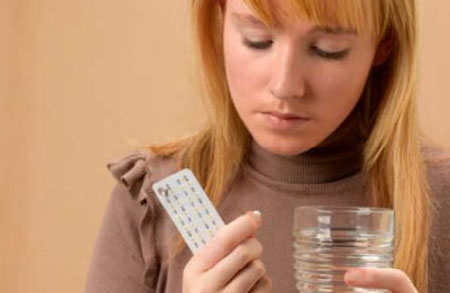紐約市衛(wèi)生部門在13所公立中學(xué)推出一個(gè)名為“青少年與全面健康”的試點(diǎn)項(xiàng)目,允許這些學(xué)校為女生發(fā)放緊急避孕藥,希望以此降低青少年懷孕率。紐約也因此成為美國首個(gè)為學(xué)生發(fā)放處方緊急避孕藥的城市。該項(xiàng)目試點(diǎn)學(xué)校多選在沒有醫(yī)療中心的貧困地區(qū),學(xué)校會(huì)給家長寄送一封說明信,如果家長在一個(gè)月內(nèi)沒有回復(fù)就表示同意讓自己的孩子參與該項(xiàng)目。到目前為止,僅有1-2%的家長表示放棄參與。該試點(diǎn)項(xiàng)目會(huì)在今后繼續(xù)擴(kuò)大范圍,直到覆蓋紐約市內(nèi)所有公立中學(xué)。據(jù)紐約市衛(wèi)生局介紹,去年紐約市17歲以下的女孩中有7000人懷孕,90%都是意外受孕;這其中有64%做了流產(chǎn),約有2200名女孩子在17歲時(shí)就當(dāng)了媽媽。

 |
|
The pilot program that allows teens to access the contraceptive drug Plan B in 13 New York City schools -- perhaps the first of its kind in the United States -- may be eventually implemented citywide. |
The pilot program that allows teens to access the contraceptive drug Plan B in 13 New York City schools -- perhaps the first of its kind in the United States -- may be eventually implemented citywide.
According to the city's Board of Health, parents can "opt out" of the program, but only 1 to 2 percent has chosen to do so.
"The proof is in the pudding," said health department spokesman Chanel Caraway. "Overall, this suggests that parents are OK with the service being available to their children."
Last year, when the plan was implemented, about 4.7 percent of the 12,000 girls enrolled in those schools were given the prescription drug, according to the Board of Health. Students ranged in age from 14 to 18.
This year, the program was expanded from five to 13 schools, and Caraway said they intend to continue expanding to eventually cover all of the city's public schools.
Plan B, also known as the "morning after" pill, works in a similar way to birth control pills, except it is taken after sex to prevent an unplanned pregnancy, according to its manufacturer Teva Pharmaceuticals. The pill should be taken as soon as possible within 72 hours of unprotected sex or birth control failure.
Plan B should not "affect or terminate" an existing pregnancy, according to the company's advertising.
New York City's pilot program, Connecting Adolescents To Comprehensive Health or CATCH, is aimed at stemming the teen pregnancy rate, which causes many girls to leave school.
The CATCH program targets selected schools in poorer districts without health centers.
Parents are sent a letter informing them of the availability of contraception. If they do not check a box telling the school not to distribute contraceptives to their child, the student may access the drugs without permission.
"We wait about a month to give parents a chance to read the letter and opt out," said Caraway. "After that, any student at one of these schools can get emergency contraception or a pregnancy test if they feel they may be pregnant or have had unprotected sex."
Students have long had access to condoms in the city schools.
Last year, Department of Health doctors prescribed Plan B to 567 students. Another 580 students received hormonal birth control pills. This fall, teens will also have access to Depo-Provera, an injectable form of birth control.
According to the Board of Health, 7,000 girls under age 17 got pregnant last year throughout New York City and 90 percent were unplanned. Of those, 64 percent were aborted. About 2,200 teens became mothers by age 17.
相關(guān)閱讀
(Agencies)

(中國日?qǐng)?bào)網(wǎng)英語點(diǎn)津 Helen )
